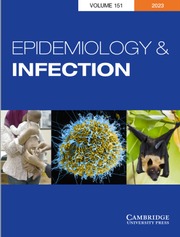Article contents
Effects of oxygen on aerosol survival of radiation sensitive and resistant strains of Escherichia coli B
Published online by Cambridge University Press: 15 May 2009
Summary
The aerosol survivals in air and nitrogen of radiation sensitive and resistant mutants of Escherichia coli B have been determined with logarithmic and resting phase bacteria. No consistent correlation was found between radiation sensitivity and aerosol sensitivity in the strains tested. Hence, the phenotypes Fil Her Exr, which determine sensitivity to radiation, do not influence aerosol survival, i.e. these known mechanisms which repair radiation-induced damage do not operate in aerosol stressed E. coli. In all cases the survival in air was less than that in nitrogen particularly so for E. coli Bs-1. The effect is explained in terms of a toxic action of oxygen. Comparison of survival of log and resting phase bacteria show that log phase cells are less aerosol stable than are resting phase cells. The ability to synthesize DNA in bacteria collected from the aerosol was less than in control unstressed bacteria, and this effect was independent of the presence of oxygen. Reduced ability to synthesize DNA could have been caused by reduced metabolic activity. It is shown that two different death mechanisms occur simultaneously in aerosols at low relative humidity. One mechanism is oxygen dependent and the other oxygen independent. The former was not through a decrease in metabolic activity, whereas the latter could be.
- Type
- Research Article
- Information
- Copyright
- Copyright © Cambridge University Press 1971
References
REFERENCES
- 10
- Cited by


